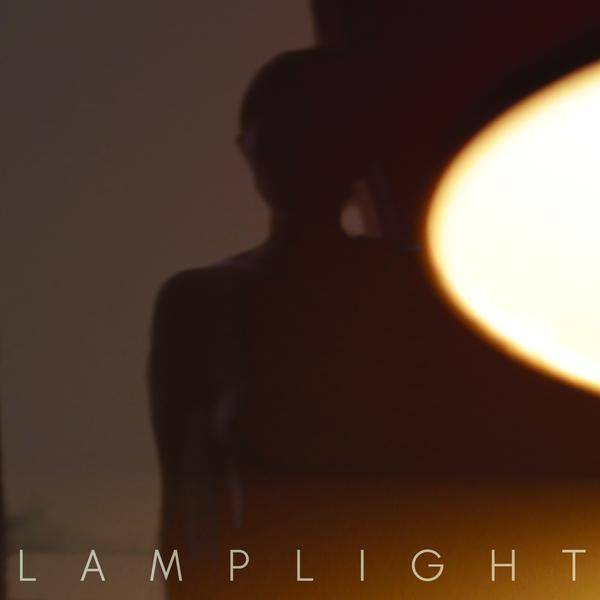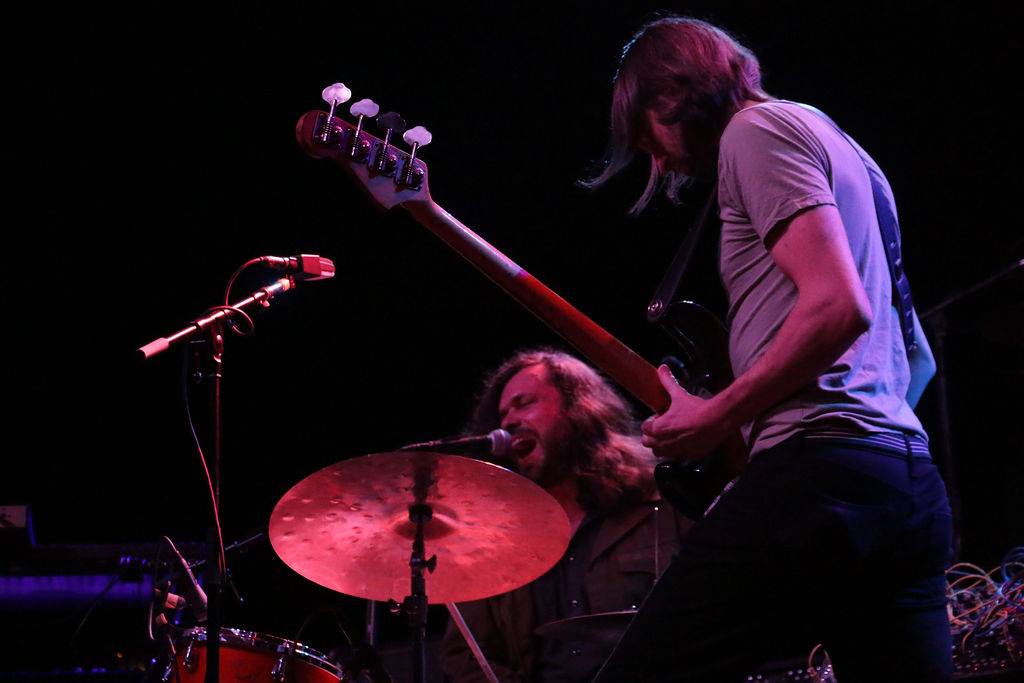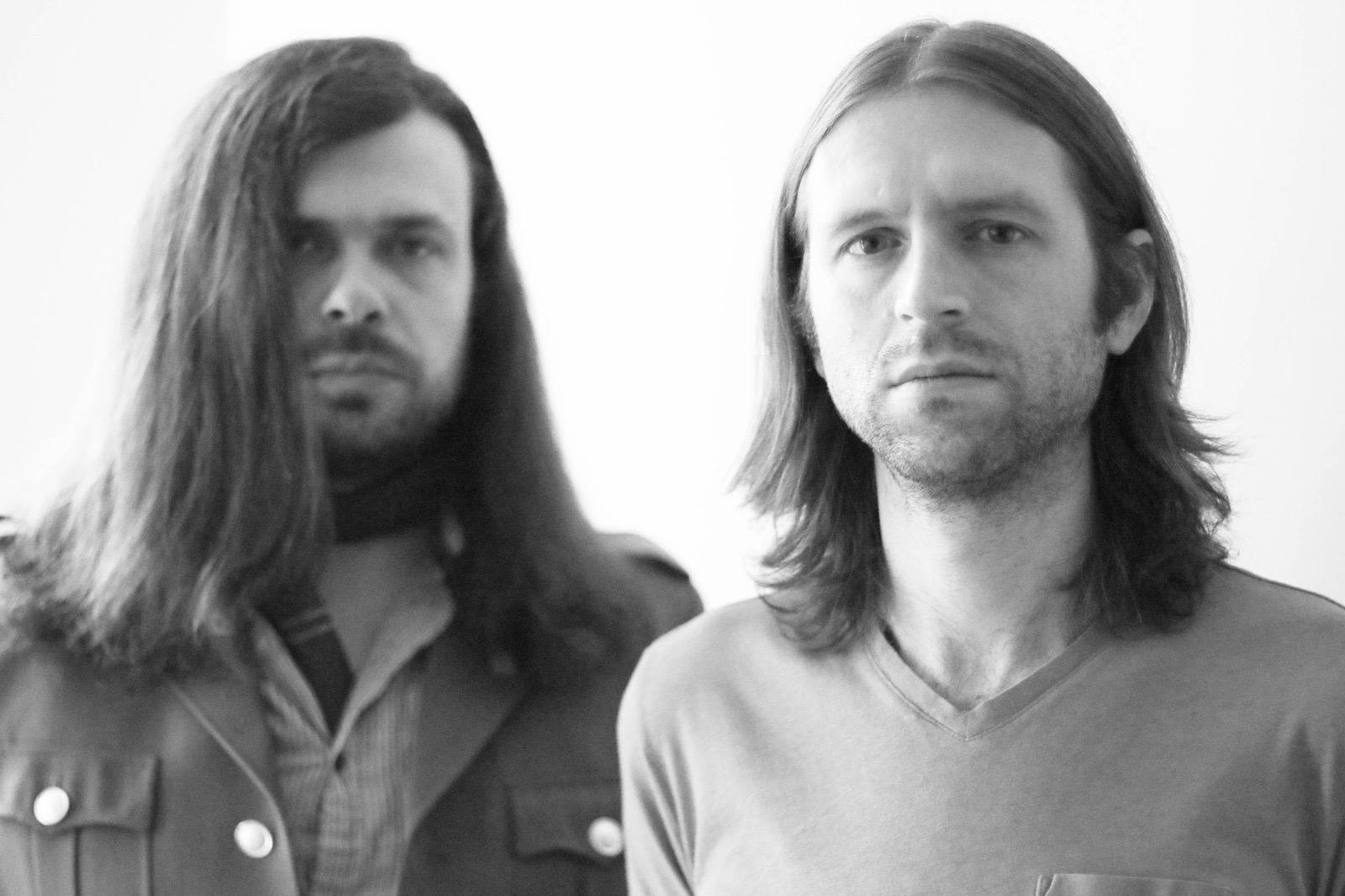Paris Monster is a duo out of Brooklyn, New York. They combine soulful vocals with sparse, linear drumming; fuzzed out bass with grinding synth; all atop a “eurorack” modular synth backdrop. If you’re wondering how a duo can cover vocals, drums, synth, bass, and extra synths, that’s because Josh Dion covers vocals, drums, and synth all at once, while Geoff Kraly handles the bass and sequencing the eurorack. It’s almost a shame to mention this novelty — I fear that it does a disservice to the musicianship on full display in Paris Monster — they don’t sound like a duo. If you only heard their music, you would have no idea of the musical economy at play, but to see it in action is as humbling as it is thrilling. It’s definitely a reminder that you should probably be practicing.
Initially, it would be tempting to focus only on Josh Dion, and the remarkable feat that he is accomplishing by absolutely jamming on the drums, synths, and vocals (complete with diva-esque hand gestures — the guy is into it), but to ignore Geoff Kraly would be criminal. His bass lines are catchy, memorable, and grooving. He spends as much time on the upper octave of his bass as he does in the lower, filling double duty, covering the sonic landscape that would normally be covered by guitar, before descending back into the bass register. On top of that, he is responsible for sequencing the modular synths that provide an extra layer of depth and texture to the soundscape. Finally, he serves as the band’s lyricist, and the lyrical content is excellent.
Listening to and observing this duo is a masterclass in musical economy. Between the two of them, they are covering a lot of ground, but there is nothing “busy” about it. Every piece, every layer, is the product of intentional thought.
I spoke with Josh and Geoff by phone in late January, in advance of their show this Saturday at Blackbird in Urbana.
Smile Politely: I first ran across you guys after seeing a Drumeo [a popular drumming instructional producer] post on Instagram featuring Josh in November of last year, and there was some interesting commentary in that post, where Josh had commented, “Really, you should listen to the full band.” That led me to the Meinl Sessions videos that you had done, and I was just really blown away by your performance of “Hot Canyon Air” in particular. I couldn’t believe my luck to see your tour announcement, which showed that you were coming through Urbana. Have you been through Urbana before?
Geoff Kraly: I went to school in Chicago, so I made the trip down once, I think.
Smile Politely: Out of curiosity, where did you go to school, and what did you study?
Kraly: I went to Northwestern, and I studied music. Music Cognition. I loved being in Chicago — a ton of good music there, that’s for sure.
SP: Josh, have you been down here before?
Josh Dion: I had a gig there, back in… 2002? I don’t remember what the place was called, but I was just there for the one night. I’m looking forward to coming back and having an actual experience!
SP: That sounds great. I understand that you have a new album coming out.
Dion: Yeah, Lamplight. We’ve had copies of it at shows, but we are going to have a release on all platforms on the 25th [of January]. We have vinyl on the way as well, finally.
Kraly: By the time we get to Urbana, it will have just been released.
SP: Given the interesting instrumentation that you have, how does the writing process work for you guys?
Kraly: It varies. We kind of always start with the music and the words before we get in there and figure out how we are going to arrange it, because we want it to be songwriting-based, more than anything. But yeah, given that it’s a two piece with weird instrumentation, we have to immediately be thinking about that–how we are going to translate it to our set up, which presents some unique challenges.
SP: Right.
Kraly: There aren’t really any chordal instruments when we are playing live — it’s pretty much all monophonic sounds. It’s very rhythm based, very groove based, and pretty wide open because of that, too.
SP: It’s sort of a study in minimalism it seems like.
Kraly: right, yeah. Hopefully.
SP: Especially on the drumming. It’s such good drumming, and to think that it’s only utilizing three limbs. I think there’s a lot to be learned there for other drummers. Geoff, in terms of your bass playing, do you find that your bass playing in Paris Monster differs from other projects that you are in?
Kraly: Oh yeah, definitely.
Dion: I was going to say, even the way that he always played bass in any situation is very melodic. So in Paris Monster, not only is he covering the bass, but he’s covering a lot of the guitar territory as well. It’s very cool, I love hearing it. I feel like he put the work in to find what that sound was, but I feel like it came natural, as well.
Kraly: A lot of the sounds that I use are designed specifically for this project. I have felt that when I have brought them to other settings: they’ll work, and they’ll translate, but I can kind of feel that, “Oh right, I designed this for a specific Paris Monster song,” or “I designed this for a specific function in our band.” But yeah, developing those sounds is just an extension of who I am as a musician, and what interests me as a musician. It’s nice having this band as an outlet for whatever I am wanting to explore. For both of us, I’m sure.
SP: Not to get too technical about it, but are you using octave pedals to fill out that mid-range? I know you use a lot of feedback, as well.
Kraly: Yeah. Exactly. I have a pitch shifting pedal that I used to shift my sound up an octave and two octaves. Most of Josh’s keyboard sounds are synth based, and his drums tend to be tuned low, so that register tends to be wide open for me to explore. So yeah, I am often in that upper register. I also have a modular synth rig that I operate.
SP: Right. Is that a eurorack module?
Kraly: Right, exactly.
SP: I’m curious about that. A lot of the eurorack sounds seem to be more noise based, so what is the writing process like there? What are you thinking about when you are setting up a sequence?
Kraly: That’s a good question, and a tough one. In the studio, it’s so wide open, because we have so much time to explore that instrument, which can really be anything that you want it to be, because you are building that sound from scratch. So, in the studio, we will use it for atmospheric sound design, or something that — like you said — is just noise, pitchless noise. It may also be rhythmic sequences that are random, and just blend in with Josh’s drums. Live, it tends to be more of the latter. It’s always random, it’s never doing any repeating, live, which we like, because it never creates something that we have to respond to. It’s almost like the synthesizer is improvising, more than we are.
SP: So are you setting up a sequence that you roughly know how it will unfold, or are you starting from scratch each time, seeing where it goes?
Kraly: I guess it’s both. I have pre-patched it so that it is doing random things, live. So, I never know what’s going to come out of it, within a range. There are six sounds on it for our live set up, and each has a specific tone, but I never know what it is going to come out of it, within a range.

SP: Cool. I wanted to ask you a few questions about, “Hot Canyon Air.” I really gravitated to that song, and watched several different live versions — the Meinl Sessions performance, and a Sofar Sounds performance. It seems like there is a fairly wide range of dynamic performances of that, where the Meinl Sessions sounds heavier, and grindier, but there are some performances that are much more delicate. One take almost sounded to me like — I know this sounds weird — but almost like Reggae. Is that an intentional thing, where you intentionally say, “Let’s make this more raw, or–
Dion: That’s such a cool question, man. I’m so glad you noticed that. A lot of it has to do with the room that we’re in. The Sofar — that show — I had no monitor. So I was literally just singing inside of my head, and out in the PA, so I’m hitting the drums a lot lighter in that one. It’s probably a lot mellower. But when we are on these big stages some times, we freakin’ rock out, because Geoff’s sound can expand, and a synth bass going through that PA is just going to be absurd. So that’s probably what you’re noticing — those kind of things. Geoff gets more feedback when we’re louder, and I maybe sing a little harder. Who knows. Personally, I think that song is cool when it’s somewhere in the middle.
SP: Josh, you almost have like a Soul-inspired vocal styling, which is on that more delicate end of the spectrum, but bass sounds, and synth sounds are on the heavier end of the spectrum. Do you have a concept as a band that you intentionally gravitate towards?
Kraly: I think the balance of those two things is what we aim for.
Dion: Yeah, that’s really it, and honestly, man, I want the vocals to be even softer. [laughs] I don’t mean like in volume, I mean that I don’t want to have to freak out every time, and still have the music be powerful. It’s interesting. But yeah, the vocal styling comes from R&B, funk, gospel, motown, as much as possible.
SP: Lyrically, what’s the writing process like? Are you drawing from personal events or is it intended to be more abstract?
Geoff: In this band, basically the way we do it is that Josh writes the music and I write the words, with some overlap, and we are constantly checking in with each other. I guess that it can’t ever not be from personal experience, whether that is on the surface or buried underneath. In this band, at least on Lamplight, are a little more obcure, like you were saying, a little more abstract. But there are always clear characters and voices in mind, for sure.
SP: One lyric that I wanted to ask you about in particular is off of Hot Canyon Air, and I believe it’s, “Where dreams go, hot canyon air may blow.” To me, it sounded like you were getting at the idea that you may have these dreams and goals, but there might be nothing there at the end of the day. Can I ask what that line means to you?
Kraly: Oh yeah, it’s, “Where dreams erode.” But yeah, you’re on the right path there. It’s like, where dreams erode — where things go wrong in a relationship — while that’s a bad thing, it’s also a place for new opportunities, a new opportunity for growth if you don’t give up on the relationship. It’s an opportunity to learn something about the other person, and yourself, and to act on it, and improve the relationship.
SP: That’s great. I appreciate you indulging that question. Josh, you are holding down drumming, vocal, and synth duties — how did you even discover that you could do that?
Dion: I just started messing around — probably 10 years ago. I have been doing this for a long time, but people are just now starting to notice — probably because of the Drumeo, and a few of these YouTube videos. I will admit that, since Paris Monster started, it actually found a place, musically. Like, a direction. But it started out with little videos on Facebook, or, you know. I always messed around with it. I always played keyboards, but I was never confident enough to just play keyboards. It didn’t feel natural. If the music sounds good, that’s all that matters. When I listen to Paris Monster stuff–and no one likes listening to their own stuff–but to me it just sounds like music. It doesn’t sound like a guy playing keyboards and drums to me. So I have to go with it. It’s an evolution that took place in my life. A lot of our peers are really supportive of us as artists, and it feels good, but I never set out to be like, “Oh, check out this party trick.” The truth is that I sit down with the keyboard, and I come up with something, and then I figure out a beat that goes with, and then I sing. That’s all that it is.

Photo by Elizabeth Lauren West Photography
SP: Yeah, I think you hit it on the head. If you didn’t see a video, and just listened to the track, you wouldn’t think it was a two man band, you’d think it was a three or four man band.
Dion: Yeah, and sometimes we try to do too much, because we have all of these sounds. You’re always editing yourself, trying to figure out ways to be more honest about what you’re doing. We’re always stripping things away. It’s always a process. Sometimes as a duo, you’re more unified if you’re doing simpler stuff together. It’s an experience, especially being in a duo, energy wise. Every type of band has a feeling. A trio has a certain feeling. A duo has a certain feeling. A big funk band has a certain feeling.
SP: When you write keyboard parts, knowing that it’s going to be on your right hand, more or less, do you write with that in mind? Or do you compose on both hands to orchestrate and then strip it back later?
Dion: It can happen any way. Lately, I haven’t had a drumset set up, so I have just been on the keyboard, doing whatever.
Kraly: A lot of times the drums and keyboard happen at the same time.
Dion: Yeah, a lot of times I just sit down at the set up and start messing around. Most of the time the drums are just keeping the beat, and the keyboards are leading the way. So yeah. Practice, record yourself. You know. Whatever it takes.
Paris Monster performs on Saturday, February 16th at Blackbird in Urbana. Tickets are $7.








